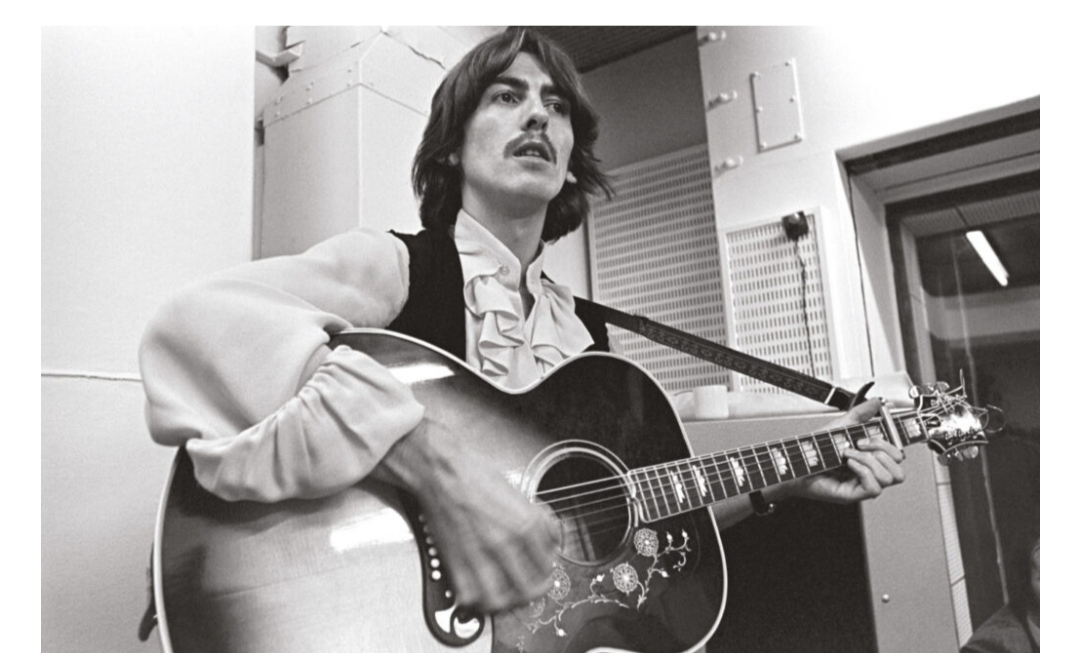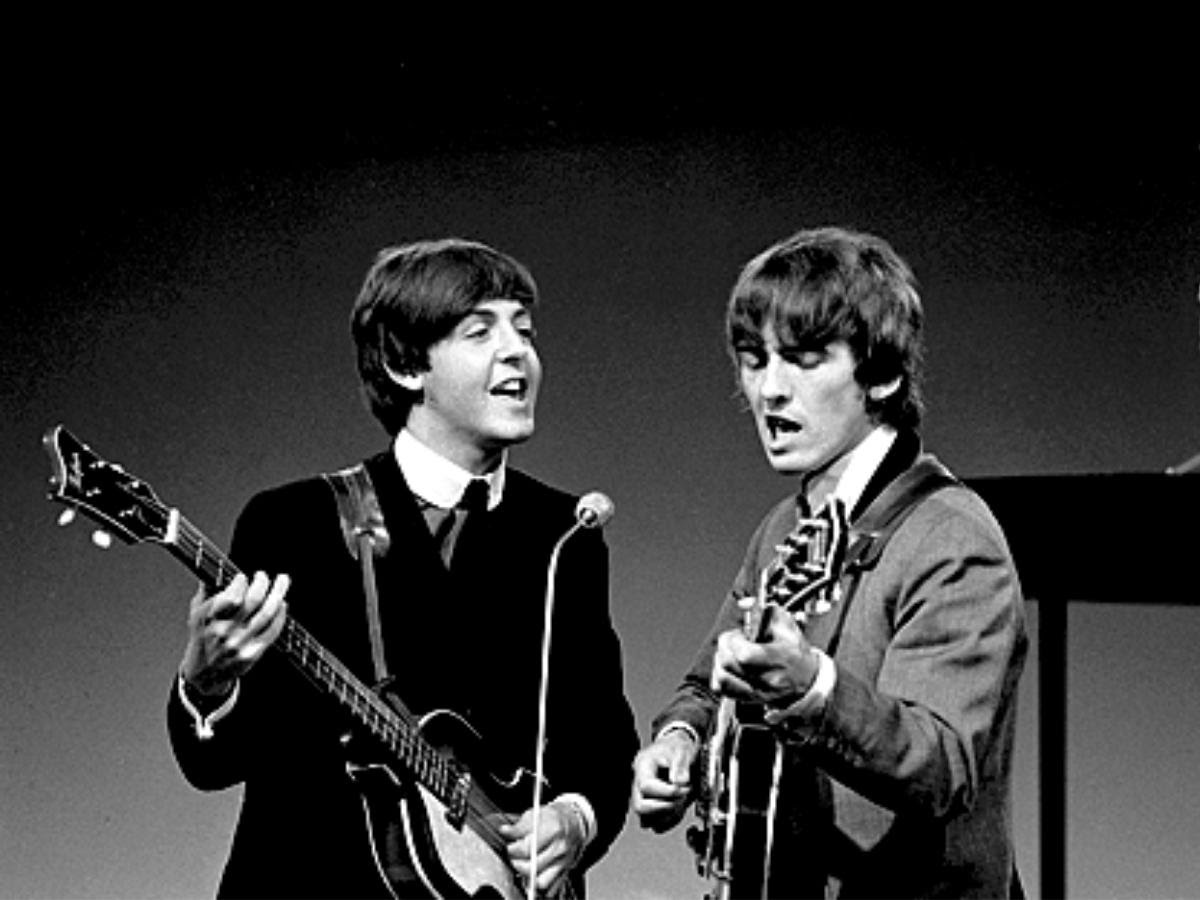The so-called ‘Quiet Beatle’, George Harrison, gave the impression of being silenced rather than naturally reticent, especially towards the end of the 1960s. As the youngest Beatle, a hierarchy was palpable, if only to Harrison, but over time, he gained confidence in his own creativity. As seen in Peter Jackson’s 2021 documentary, The Beatles: Get Back, a struggle for power and album real estate ultimately led to Harrison’s departure and the end of the band’s winding road in 1970.
Although The Beatles navigated the swinging ’60s as a tight unit, their success can be attributed to a crucial sum of disparate personalities. Despite his equally sharp wit, Harrison gave a more severe impression than Sad Clown Paradox Exhibit A, John Lennon, and his amiable sidekick, Ringo Starr.
Meanwhile, Paul McCartney was responsible for somewhat “fruity” or kitsch songs in his otherwise laudable locker, such as ‘Maxwell’s Silver Hammer’, ‘Ob-La-Di, Ob-La-Da’ and ‘Rocky Raccoon’. Although he wasn’t at liberty to drop such ill-conceived clangers, Harrison was still highly unlikely to write any songs of this nature. Harrison’s most tongue-in-cheek song for the Beatles was perhaps the propulsive Revolver opener ‘Taxman’, but even between these humorous lines was a grave reality.
Harrison’s first solo songwriting credit for The Beatles was ‘Don’t Bother Me’, a track from 1963’s With the Beatles. Taking a leaf from the Lennon-McCartney songbook to date, Harrison proved his lyrical talents with a shrewd sign of better things to come.
In 1965, Harrison notably introduced the sitar to Western music, playing the instrument for the first time on John Lennon’s Rubber Soul cut ‘Norwegian Wood (This Bird Has Flown)’. These Eastern influences permeated the following two albums more profoundly and brought crucial vigour to Harrison’s more accomplished songwriting credits, ‘Love You To’ and ‘Within You Without You’.
As anyone familiar with the term’ learning curve’ would expect, Harrison’s greatest songwriting contributions to The Beatles fell in the closing chapters of the band’s history. Indeed, many fans seem to agree that Harrison’s two solo credits on The Beatles’ final recorded album (penultimately released), Abbey Road, are among his finest.
Despite the efforts of the Lennon-McCartney dream team, Harrison’s ‘Here Comes the Sun’ remains The Beatles’ most popular song among modern listeners and their only entry to Spotify’s coveted ‘Billions Club’ to date. Mildly overplayed but still a tangible message of springtime hippie optimism, this song is a veritable frontrunner.
On a more romantically refined note, the seductive crooner Frank Sinatra once noted that ‘Something’ was “the greatest love song of the past 50 years”. The melody, production and lyrics are all on point; however, it loses a degree of romance when one discovers that Harrison sang, “Something in the way she moves, attracts me like a pomegranate,” before finding an agreeable substitute.
“Everybody assumed I wrote it about Pattie. The words are nothing, really,” Harrison told the NME, reflecting on the song in 1969. “There are lots of songs like that in my head. I must get them down. Some people tell me that ‘Something’ is one of the best things I’ve ever written. I don’t know. Maybe they’re right, maybe they’re wrong. It’s very flattering, though… It’s nice. It’s probably the nicest melody tune that I’ve written.”
When looking for a definitive answer to my titular question, streaming popularity, Frank Sinatra and George Harrison himself may well be credible bases of argument. On the contrary, you may stand, hand over holster, ready to pull out the old “it’s subjective” card. I take all such angles into consideration and cast them out the window to make room for my own superior opinion: ‘While My Guitar Gently Weeps’ was George Harrison’s greatest song for The Beatles!
Released as one of two Harrison compositions on the 1968 album The Beatles (“The White Album”), ‘While My Guitar Gently Weeps’ is a towering example of songcraft in its finest, highly accessible form. Harrison’s enveloping instrumentals are characteristically severe, with all components meshing in tense harmony, from Starr’s hi-hat to Eric Clapton’s arresting lead work.
Clapton’s salient guitar musings are undoubtedly a terrific boon to the album version of the track, but ‘While My Guitar Gently Weeps’ is also a prime example of Harrison’s lyrical command. More poetic and evocative than ‘Something’ and more chilling and transportive than ‘Here Comes the Sun’, this masterpiece is elusive but throbs with emotional gravity reflective of life’s bitter truths. As we all know, even at 25, Harrison displayed the wisdom of a thousand lifetimes.
Similar to McCartney’s ‘The Fool on the Hill’, ‘While My Guitar Gently Weeps’ appears to connote a sage, omniscient entity. In The Beatles: Anthology, Harrison recalled writing the song after reading the ancient Chinese divination text, I Ching, or The Book of Changes.
“The Eastern concept is that whatever happens is all meant to be,” Harrison noted. “Every little item that’s going down has a purpose. ‘While My Guitar Gently Weeps’ was a simple study based on that theory… I picked up a book at random, opened it, saw ‘gently weeps’, then laid the book down again and started the song.”
‘While My Guitar Gently Weeps’ has been revised and covered countless times over its 55 years of existence. Of course, the 1968 album version is enrapturing, but the LOVE version, produced by George Martin in 2006 using Harrison’s acoustic rendition and additional orchestral arrangements, is also essential.



